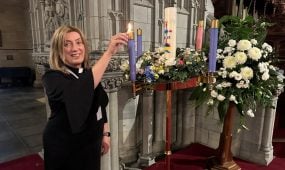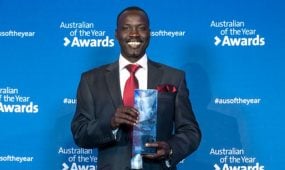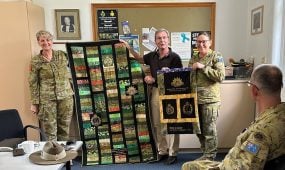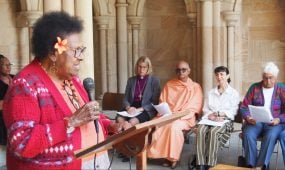Q&A with Prince Charles Hospital volunteer pastoral carer and St Matthew's, Grovely parishioner, Margaret Atkin
Spotlight Q&A
Meet Margaret Atkin and find out about her work overseas as a journalist and a nurse, her latest book Frigate Birds, the best piece of advice she’s ever been given and how faith inspires her life

Where do you currently live and where do you worship?
I live at Ferny Grove and I worship at St Matthew’s, one of the oldest churches in Brisbane.
How long have you been involved in the Anglican Church and in what roles?
I was confirmed in Wellington in late 1984 and have been a parishioner since then.

Margaret Atkin hammering ngali nut for cassava pudding at Tawatana, Solomon Islands in October 2022
You recently wrote a book titled Frigate Birds. Can you tell us a little about your book?
The full title is Frigate Birds, Forty years with the Solomons and that is what it is. I married George, a Solomon Islands journalist in 1976, and lived in the Solomons until 1984 working as a nurse and journalist. Then I returned witnessing riots, logging, and with others introduced the Gardasil vaccine that prevents 90 per cent of cervical cancer (a major cause of death for women). My last trip was in October 2022 and I witnessed the outcome of poor political decisions made many years earlier.
What was the highlight of writing your book and why?
The launch was on 6 May this year. My eldest son Brian was MC and Joe Tooma, former CEO of the Australian Cervical Cancer Foundation, and Martin Hadlow, a radio journalist working while I was there, spoke. I felt that my work had finally been recognised.

Margaret’s husband, George Atkin, at Tawatana, Solomon Islands in October 2022
What are your plans and goals for the next 12 months?
I will continue with pastoral care ministry, promote Frigate Birds and advocate for cervical cancer prevention in the Pacific. I will continue writing my next memoir about a Cambodian AIDS epidemic. I will return to the Solomons, publish my second edition, and support two Solomon Islands authors who have requested assistance.
How does your faith inspire you and shape your outlook, life choices and character?
I believe we are called to be the light of the world and God’s presence on earth. I practise Christian Meditation, aspiring to wait on God. I follow my instinct, my dreams, and have found that even in overwhelming situations God is there, and things work out. Because of the resurrection and my experience during family deaths, I believe in life after death, and this gives me courage.
Can you tell us a little about your personal faith journey?
While I was a journalist in the Solomons, I read the New Testament every night. I loved Jesus and his justice and mercy, and I was confirmed when we returned to New Zealand. There was a major family tragedy and although my faith was shaken, it prevailed. It gives me courage.

Margaret Atkin with a copy of her book Frigate Birds at All Saints’, Arana Hills in May 2023
What is your favourite scripture and why?
“The light shines in the darkness and the darkness did not overcome it” (John 1.5). I have experienced great darkness at times, personally and during my volunteer and work life, and my experience confirms the truth of the verse.
What person of faith inspires you the most and why?
Desmond Tutu; his faith, his sense of justice, his courage, his example and his humility.
Why is the Uluru Statement From the Heart, including the Voice to Parliament, so important?
This is the oldest continuous culture in the world. I have worked in remote Australia and been very moved at their deep connection to land. There is also great injustice and trauma and a Voice to Parliament would finally allow First Nations people to participate and contribute to the decisions that affect their people. It is long overdue.
What are the primary strengths of the Church and what is the best way to make the most of these for the benefit of our communities?
The people, although many are elderly, have wisdom compassion and faith, which is too often under-acknowledged and under-utilised. Also, the services the Anglican Church is already providing, for instance the great work done by Anglicare Southern Queensland’s Homelessness Services Supportive Accommodation for Women and their Children in Toowong.
What is the kindest gesture you have ever received or witnessed?
After my brother, his wife and two of their three children were killed in a car accident in New Zealand in 1986, the youth worker of Newlands Parish, Chris, came and sat with me. All he said was, “Don’t try to understand it.”
What is the best piece of advice you have ever received and who gave you this advice?
When I arrived as an Australian volunteer at the border town in Cambodia during the AIDS epidemic in 2000 (50 percent of the sex workers were positive) I was overwhelmed.
My father wrote “You’ll find a way,” and slowly I did.
What book have you given away most as a gift and why?
My father R.R. Lycette’s book Fragrant Harbour about two refugees making their way in Hong Kong after fleeing from the Cultural Revolution in the seventies. Everything in the book happened. It is a fine novel and has been published.

Martin Hadlow, Margaret and Brian Atkin at the Frigate Birds book launch, All Saints’, Arana Hills in May 2023
Where do you do your best thinking?
In my room in the early morning.
What is your earliest memory?
My father was a doctor and we lived at the hospital. I remember a very bloodied man being carried in. He was in hospital for a long time. I was about four. I used to show him the paintings I did at kindy.
If you are having a bad day, what do you do to cheer yourself up?
Go for a walk with my headphones on and listen to ABC Classic radio.
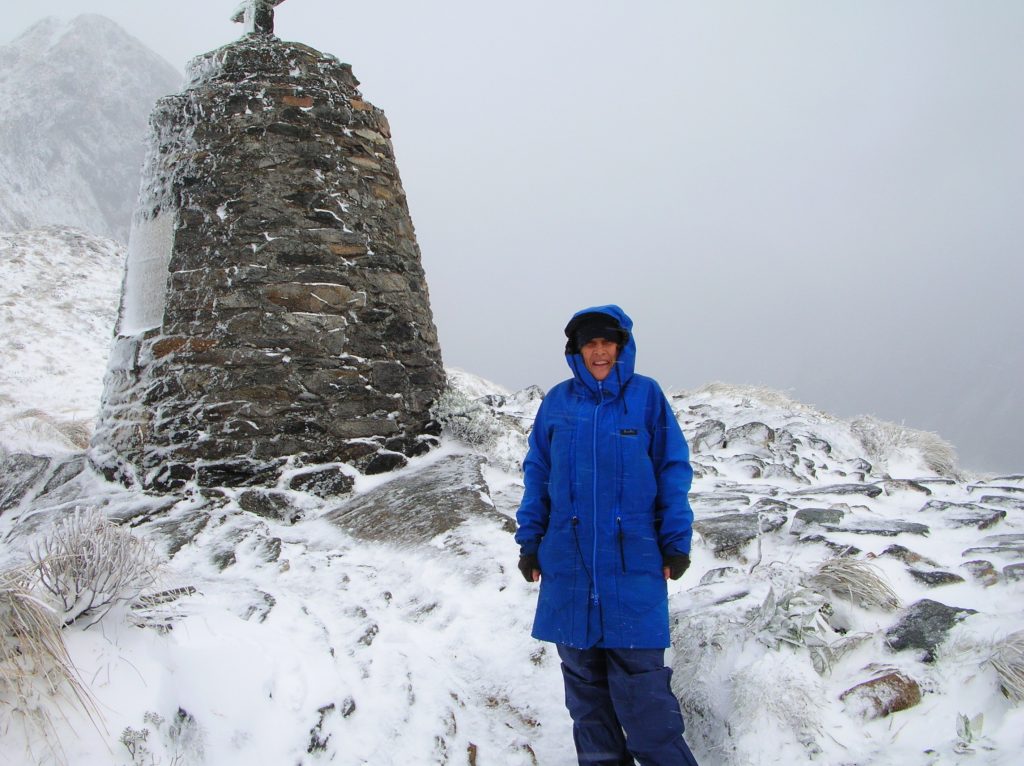
Prince Charles Hospital volunteer pastoral carer and St Matthew’s, Grovely parishioner Margaret Atkin at the summit of the Milford Track, New Zealand in December 2008
What is the funniest thing that happened to you recently?
After my 92-year-old mother fell over her alarm went off, and the neighbours came over and picked her up. She gave them a copy of my father’s second novel saying it was raunchy and unsuitable for “the boys.” Their mother replied in partial jest, “For goodness sakes, Gill, they’re both over 18.”
What makes you nostalgic and why?
Hearing my father’s favourite classical music. He died over 10 years ago.
What is your secret skill?
Getting on with children. I am as curious as a child.
What’s your unanswerable question – the question you are always asking yourself?
Why can’t we do more about climate change?

